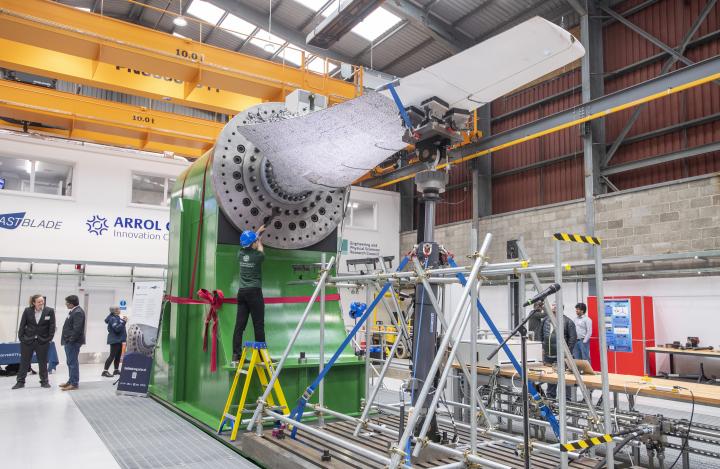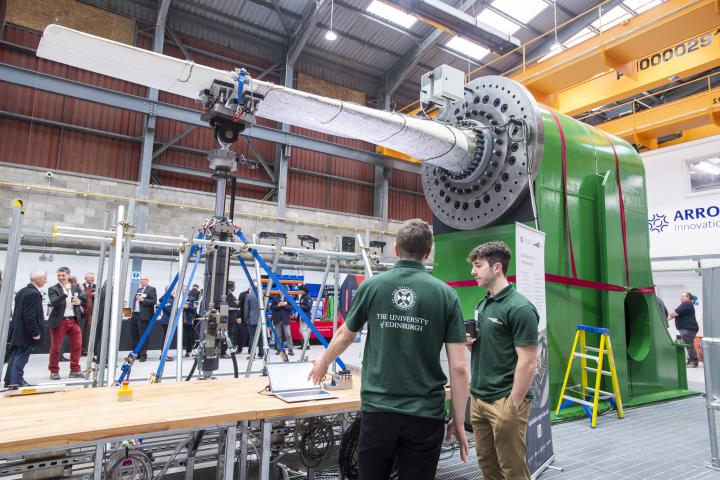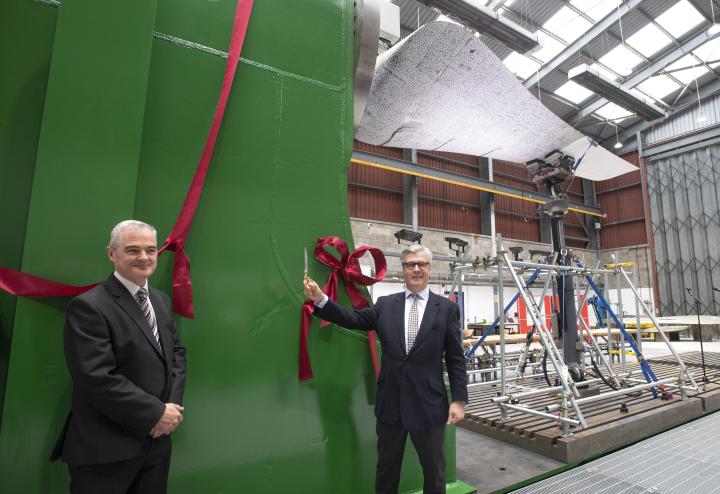The world's first rapid testing facility for tidal turbine blades, which researchers say can speed up development of marine energy technologies while helping to reduce costs, has opened for business.

FastBlade's pioneering technology will stress test blades made from composite materials - which must withstand harsh ocean conditions for 20 years - more quickly, and using significantly less energy than any other facility of its kind, the team says.
Based in Rosyth, Fife, the £4.6 million facility - which was officially opened by UK Government Minister for Scotland Malcolm Offord - aims to maintain Scotland's position at the forefront of tidal energy development.
Stress tests
The facility's 75-tonne reaction frame is capable of exerting powerful forces on turbine blades more than 50 feet long. Tests on blades are carried out using a system of powerful hydraulic cylinders, which, in less than three months, can simulate the stresses placed on the structures during two decades at sea.
It replicates the complex forces to which tidal turbines are exposed at sea using unique digital and hydraulic technology systems developed by engineers at the University of Edinburgh.
As well as tidal blades, FastBlade's technology can also be used to test lightweight bridge sections and aircraft wing components.
FastBlade will be the world's first dedicated fatigue test facility for tidal turbine blades, and will help this emerging industry provide clean, reliable renewable energy at a reasonable cost to consumers. The facility will also help maintain the globally leading position of Scottish tidal turbine developers in the race to find sources of clean and secure power, as well as confirming the societal impact of the University of Edinburgh's research and development efforts in marine renewable energy.

Innovation hub
By providing developers with better data on how tidal turbine blades deteriorate over time, the research team hopes to help optimise the design of more durable, efficient structures. FastBlade will also offer client businesses and engineering students and apprentices the chance to develop their digital and data skills in its state-of-the-art research centre.
It is the first facility to open in a recently launched multi-partner innovation centre at Babcock's Rosyth site.
The Arrol Gibb Innovation Campus (AGIC) will work with companies in the marine, nuclear power and energy-transition sectors to transform large-scale manufacturing through innovation and skills development.
Today marks a real milestone for all of us involved in the FastBlade partnership. We've taken a vision of technological innovation and together we've built a ground-breaking engineering construct that can carry out large-scale accelerated testing of structural composites in a more sustainable way. Collaborations like this are fundamental to help us and the wider engineering industry create more research opportunities and secure longer-term investment into digital and data skills - an area that is significantly growing in demand for Babcock and our customers. We believe the research arm of this facility will generate real interest from students looking to learn more about sustainable technology and I'm really looking forward to working with the teams to support that skills agenda and see where this takes us into the future.

Key partnership
FastBlade is a partnership between the University and engineering company Babcock International, and is supported by a £1.8 million grant from the UK Government, via the Engineering and Physical Sciences Research Council (EPSRC), part of UK Research and Innovation (UKRI).
The facility, funded by EPSRC and the University, has received support from Edinburgh Innovations, the University's commercialisation service, throughout its development.
The UK Government is delighted to support this rapid test facility with £1.8m from EPSRC, as part of UK Research and Innovation. Crucially, it will speed up the rollout of equipment that will capitalise on sustainable tidal power and underline Scotland's place as a world leader in offshore renewables technology. This test site, born from innovative research at the University of Edinburgh and engineering firm Babcock, will not only aid the UK's Net Zero ambitions, it will support thousands of skilled energy sector jobs as we transition to a more sustainable future.






